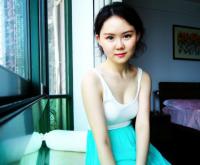A true citizen of the world, a composer whose work is influenced as much by experiences in Shanghai, New York, France, Boston, Italy, and Kansas City, as it is by the "conflict of ideologies" and abstract art, Yiguo Yan creates music of startling power and beauty. Yan's work has been recognized internationally, winning many awards and fellowships, including the 2015 American Prize in New York, the 2008 Vienna Nancy Van de Vate International Composition Prize for Opera, and France's 2011 Marion Tournon-Branly Prize, among many others. Additionally, her music has been performed in China, America, Austria, France and Italy, with conductors Mahir Cetiz, Noah Sivan and Jeffery Means. Yan currently lives in Kansas City, studying Music Composition and Theory at UMKC. It is an honor to welcome Yiguo Yan to Listen Local.
Introduce yourself. Where do you live and work?
I am Yiguo Yan, a native Chinese composer studying in the United States. Before I came to Kansas City to study with Zhou Long and Chen Yi, I’ve lived in several different cities and traveled a lot during my studying and composing. I love literature very much, as well as modern art and so luckily wherever I go, I always meet interesting and talented friends like film directors, architects, writers, or other composers and musicians. We inspired each other to create better works.
I love the Artist Statement you posted on your website. You make the point that the popular conception of the avant-garde and abstract art need to be reconsidered as ‘normal’ connections between “art history and art future.” Could you describe what makes Kansas City a hub for so many powerful avant-garde composers?
Kansas City is a very quiet and peaceful city where people can focus on their work for a long period of time without being interrupted. The museums of Kansas City display both classical and modern art; the concert halls of Kansas City produce concerts with well-balanced portions of classical and contemporary music. But most importantly is that the composition teachers in UMKC are very open to any styles of music. They encourage students to explore their unique musical languages. They never impose their artistic aesthetics upon their students, nor regulate students in a circle of the so called “academic” or “standard classical contemporary concert pieces.” Many of my colleagues are very good at electronic music and sounds installations. Kansas City has an open attitude towards the art’s future.
What tools do you use for composing? What may surprise a listener about how your music is created?
Before I started to compose, I needed to read some contemporary poems in order to send myself into a world where is full of abstract expressions. Besides reading poems, novels of Virginia Woolf, Marguerite Duras, and Nabokov, plays of Sara Kane, Samuel Beckett, and Sartre can also help me to grab the sense of expressing abstractly and freely.
What may surprise a listener about how my music is created is that I don’t use MIDI to listen to my draft, I don’t often play on the piano to confirm the sounds from my draft either. Because MIDI and piano can’t accurately restore the real effect of a piece, especially for those pieces with many extended techniques. My last English opera Colors of Obsessions was hand-written and was drafted on two books of staff paper. I heard every minute in my head and the first rehearsal sounds exactly like what I’ve been imagined for four months’ period of composing the opera. MIDI can only play very simple and basic articulations, it cannot generate complex, dimensional, and multi-layered orchestration and counterpoint ideas.
How do you move beyond or through creative blocks?
If I encounter creative blocks, I need to push myself harder to be more creative. Samuel Beckett used to complain to his friend that he was out of inspiration and he felt horrible after he won the Nobel Prize in literature. But he overcame himself and after several years he published one of the most influential contemporary plays, Waiting for Godot. This story can forever encourage me. Every time when I felt like burnt out of ideas, I read Waiting for Godot and think that it was created by Beckett when he thought himself was completely out of ideas, then I got back to work.
What inspires you the most about the Kansas City classical music community?
Chen Yi and Zhou Long inspired me the most in Kansas City. They are very generous and kind-hearted people. Actually they are the reason why I came to Kansas City. When I studied with Mario Davidovsky in NYC, he often mentioned them in classes, he said they are very talented, Chen Yi has very impressive musical techniques and Zhou Long is as thoughtful as a philosopher. When I first met them in person on November of 2014 in Carnegie Hall, I was amazed by how humble they are: after their pieces been performed, they helped the players to move some very heavy percussion instruments to their truck. They didn’t act like arrogant celebrities at all. Suddenly I felt so warm and I knew they are the teachers I can totally trust. I’m glad to study with them now. I enjoy talking about anything related to music with them because when they talk, they sound so incisive and profound, they have very deep understanding of art beauty.
Yigou Yan's recommendations from the Johnson County Library catalog:
1. One Hundred Years of Solitude by Gabriel Garcia Marquez
2. No Exit by Jean-Paul Sartre
3. The Lover by Marguerite Duras
4. Orlando: A Biography by Virginia Woolf
5. Black Spring by Henry Miller
6. The Dying Animal by Philip Roth
7. The Book of Laughter and Forgetting by Milan Kundera
8. Lolita by Vladimir Nabokov
9. The Bell Jar by Sylvia Plath
10. The Harvard Book of Contemporary American Poetry by Helen Vendler

